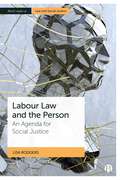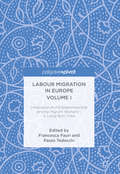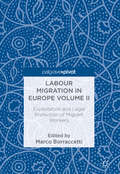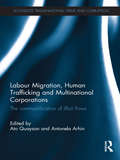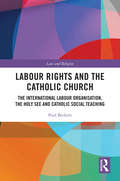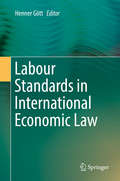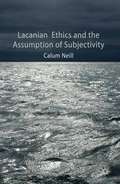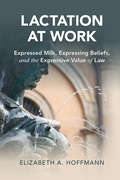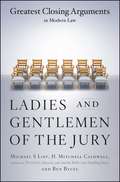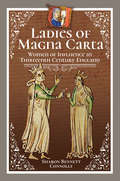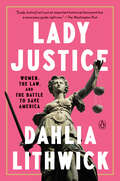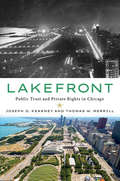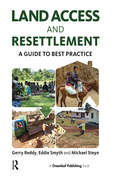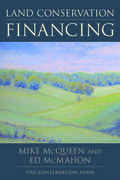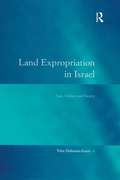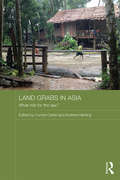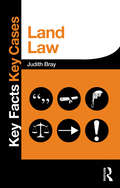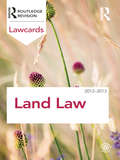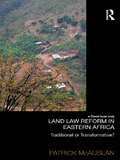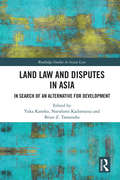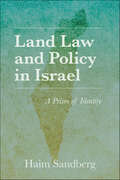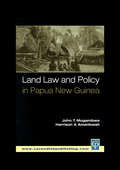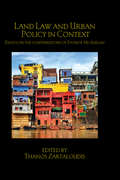- Table View
- List View
Labour Law and the Person: An Agenda for Social Justice (Bristol Studies in Law and Social Justice)
by Lisa RodgersThis book aims to revitalise the link between social justice and labour law through exploring the issue of personhood and the 'subject' of the law. Rodgers argues that incorporating a more 'relational' notion of self into labour law not only provides a fresh normative perspective through which to evaluate existing labour laws, but will also make us more able to respond to labour market 'shocks' and labour market change into the future, including the introduction of AI. It is only by embedding relationality into our law that can we really respect the humanity of workers and construct a legal framework through which social justice can be achieved at work.
Labour Migration in Europe Volume I: Integration and Entrepreneurship among Migrant Workers – A Long-Term View
by Francesca Fauri Paolo TedeschiIn this book, Fauri and Tedeschi bring together contributions that outline the movement of job seekers and ethnic minority entrepreneurs in Europe, to analyse the overall impact of different forms of migration on European economies in the last 100 years. Contributions address a broad range of themes, from the motivations of migrants and the process of their integration into their destination country, to their overall social and economic impact onto said country at a structural level. In addressing questions as to why some ethnic groups seem to compete more successfully in business, as well as addressing questions about how skilled labour can be attracted and retained, this volume forms part of a very important multidisciplinary dialogue on labour migration. The policy implications of answering such questions are also discussed, as contributors ultimately examine whether skills-dependent migration policy needs to form part of a common strategy, either at a national or an international level.
Labour Migration in Europe Volume II: Exploitation and Legal Protection of Migrant Workers
by Marco BorraccettiViolence, deception, fraud and abuse have always been commonplace occurrences for migrants, not only in their final country of destination but also in their countries of origin and countries of transit. In today’s world, the link between mobility and security issues is ever-increasing. Acknowledging this, how can we work to protect and improve migrants’ rights? Is the protection for migrants offered by the EU sufficient as-is, or is a more integrated approach that requires greater cooperation from migrants’ country of origin called for? What role can the private sector play in all of this? In this book, Borraccetti brings together contributions that analyse how migrant exploitation can be combatted. All essays focus on the protection and promotion of human rights and pay particular attention to the rights of children and other vulnerable people.
Labour Migration, Human Trafficking and Multinational Corporations: The Commodification of Illicit Flows (Routledge Transnational Crime and Corruption)
by Ato Quayson Antonela ArhinAlthough much literature on human trafficking focuses on sex trafficking, a great deal of human trafficking results from migrant workers, compelled - by economic deprivation in their home countries - to seek better life opportunities abroad, especially in agriculture, construction and domestic work. Such labour migration is sometimes legal and well managed, but sometimes not so – with migrant workers frequently threatened or coerced into entering debt bondage arrangements and ending up working in forced labour situations producing goods for illicit markets. This book fills a substantial gap in the existing literature given that labour trafficking is a much more subtle form of exploitation than sex trafficking. It discusses how far large multinational corporations are involved, whether intentionally or unintentionally, in human trafficking for the purposes of labour exploitation. They explore how far corporations are driven to seek cheap labour by the need to remain commercially competitive and examine how the problem often lies with corporations’ subcontractors, who are not as well controlled as they might be. The essays in the volume also outline and assess measures being taken by governments and international agencies to eradicate the problem.
Labour Rights and the Catholic Church: The International Labour Organisation, the Holy See and Catholic Social Teaching (Law and Religion)
by Paul BeckettThis book explores the extent of parallelism and cross-influence between Catholic Social Teaching and the work of the world’s oldest human rights institution, the International Labour Organisation (ILO). Sometimes there is a mutual attraction between seeming opposites who in fact share a common goal. This book is about just such an attraction between a secular organisation born of the political desire for peace and justice, and a metaphysical institution much older founded to bring peace and justice on earth. It examines the principles evident in the teachings of the Catholic Church and in the secular philosophy of the ILO; together with the theological basis of the relevant provisions of Catholic Social Teaching and of the socio-political origins and basis of the ILO. The spectrum of labour rights covered in the book extends from the right to press for rights, i.e., collective bargaining, to rights themselves – conditions in work – and on to post-employment rights in the form of social security and pensions. The extent of the parallelism and cross-influence is reviewed from the issue of the Papal Encyclical of Pope Leo XIII Rerum Novarum (1891) and from the founding of the ILO in 1919. This book is intended to appeal to lay, professional and academic alike, and will be of interest to researchers and academics working in the areas of international human rights, theology, comparative philosophy, history and social and political studies. On 4 January 2021 it was granted an Imprimatur by the Roman Catholic Archbishop of Liverpool, Malcolm P. McMahon O.P., meaning that the Catholic Church is satisfied that the book is free of doctrinal or moral error.
Labour Standards in International Economic Law
by Henner GöttThe book offers a comprehensive perspective on the highly topical issue of protecting and promoting labour standards in international economic law and the globalized economy. For the purpose of an in-depth analysis of both the specific and the fundamental aspects in this regard, it combines views from specialized academics of the legal and political sciences as well as experienced practitioners. The contributions to this book do not only reveal recurring obstacles but also point at best practices and potential for synergies, providing important guidance for future research and practice in international economic and labour law and policy.
Lacanian Ethics and the Assumption of Subjectivity
by Calum NeillHowever we conceive of ethics, whether by appeal to an exterior or traditional notion of right and wrong, or by appeal to some form of individual virtue or responsibility, it implies some form of agency. Where there is an ethical act, there must be someone acting ethically. Working from this simple premise, this book argues that the manner in which we conceive that 'someone' is the condition of possibility for our conception of ethics and, consequently, our ethical potential. Against the commonplace conception of the modern individual as self-identical, self-aware and self-governing, theauthor presents a detailed introduction to the Lacanian subject, a conception of the self as anything but self-identical, self-aware and self-governing. The book goes on to show how such a rethinking of the subject necessitates a rethinking of our relation to law, tradition and morality, as well as a rethinking of our understanding of guilt, responsibility and desire. In short, it necessitates a rethinking of ethics. "
Lack of Character
by John M. DorisThis book is a provocative contribution to contemporary ethical theory challenging foundational conceptions of character that date back to Aristotle. John Doris draws on behavioral science, especially social psychology, to argue that we misattribute the causes of behavior to personality traits and other fixed aspects of character rather than to the situational context. More often than not it is the situation not the nature of the personality that really counts. The author elaborates the philosophical consequences of this research for a whole array of ethical theories and shows that, once rid of the misleading conception of motivation, moral psychology can support more robust ethical theories and more humane ethical practices.
Lactation at Work: Expressed Milk, Expressing Beliefs, and the Expressive Value of Law (Cambridge Studies in Law and Society)
by Elizabeth A. HoffmannIn recent decades, as women entered the US workforce in increasing numbers, they faced the conundrum of how to maintain breastfeeding and hold down full-time jobs. In 2010, the Lactation at Work Law (an amendment to the US Fair Labor Standards Act) mandated accommodations for lactating women. This book examines the federal law and its state-level equivalent in Indiana, drawing on two waves of interviews with human resource personnel, supervising managers, and lactating workers. In many ways, this simple law - requiring break time and privacy for pumping - is a success story. Through advocacy by allies, education of managers, and employee initiative, many organizations created compliant accommodations. This book shows legal scholars how a successful civil rights law creates effective change; helps labor activists and management personnel understand how to approach new accommodations; and enables workers to understand the possibilities for amelioration of workplace problems through internal negotiations and legal reforms.
Ladies and Gentlemen of the Jury: Greatest Closing Arguments in Modern Law
by Michael S. LiefUntil now, only the twelve jurors who sat in judgment were able to appreciate these virtuoso performances, where weeks of testimony were boiled down and presented with flair, wit, and high drama. For five years the authors researched every archive from those of the L.A. Times to the dusty stacks of the National Archives in Washington, D.C., and readers can now lose themselves in the summations of America's finest litigators. Clarence Darrow saves Leopold and Loeb from the gallows in the Roaring Twenties. Gerry Spence takes on the nuclear power industry for the death of Karen Silkwood in a modern-day David and Goliath struggle. Vincent Bugliosi squares off against the madness of Charles Manson and his murderous "family" in the aftermath of their bloody spree. Clara Foltz, the first woman to practice law in California, argues passionately to an all-male jury, defending her place in the courtroom. Bobby DeLaughter brings the killer of civil-rights leader Medgar Evers to justice after thirty years and two mistrials. Aubrey Daniel brings Lt. William Calley, Jr., to justice for the My Lai massacre. William Kunstler challenges the establishment after the '68 Chicago riots in his defense of yippie leaders known as the Chicago Seven. Each closing argument is put into context by the authors, who provide historical background, a brief biography of each attorney, and commentary, pointing out the trial tactics used to great effect by the lawyers, all in language that is jargon-free for the benefit of the lay reader.
Ladies of Magna Carta: Women of Influence in Thirteenth Century England
by Sharon Bennett ConnollyAn innovative take on Magna Carta history that examines the impact and influence of women. 39. No man shall be taken, imprisoned, outlawed, banished or in any way destroyed, nor will we proceed against or prosecute him, except by the lawful judgment of his peers or by the law of the land. This clause in Magna Carta was in response to the appalling imprisonment and starvation of Matilda de Braose, the wife of one of King John&’s barons. Matilda was not the only woman who influenced, or was influenced by, the 1215 Charter of Liberties, now known as Magna Carta. Women from many of the great families of England were affected by the far-reaching legacy of Magna Carta, from their experiences in the civil war and as hostages, to calling on its use to protect their property and rights as widows. Ladies of Magna Carta looks into the relationships—through marriage and blood—of the various noble families and how they were affected by the Barons&’ Wars, Magna Carta, and its aftermath—the bonds that were formed and those that were broken. Including the royal families of England and Scotland, the Marshals, the Warennes, the Braoses, and more, Ladies of Magna Carta focuses on the roles played by the women of the great families whose influences and experiences have reached far beyond the thirteenth century.
Lady Justice: Women, the Law, and the Battle to Save America
by Dahlia LithwickDahlia Lithwick, one of the nation&’s foremost legal commentators, tells the gripping and heroic story of the women lawyers who fought the racism, sexism, and xenophobia of Donald Trump&’s presidency—and wonAfter the sudden shock of Donald Trump&’s victory over Hillary Clinton in 2016, many Americans felt lost and uncertain. It was clear he and his administration were going to pursue a series of retrograde, devastating policies. What could be done? Immediately, women lawyers all around the country, independently of each other, sprang into action, and they had a common goal: they weren&’t going to stand by in the face of injustice, while Trump, Mitch McConnell, and the Republican party did everything in their power to remake the judiciary in their own conservative image. Over the next four years, the women worked tirelessly to hold the line against the most chaotic and malign presidency in living memory. There was Sally Yates, the acting attorney general of the United States, who refused to sign off on the Muslim travel ban. And Becca Heller, the founder of a refugee assistance program who brought the fight over the travel ban to the airports. And Roberta Kaplan, the famed commercial litigator, who sued the neo-Nazis in Charlottesville. And, of course, Stacey Abrams, whose efforts to protect the voting rights of millions of Georgians may well have been what won the Senate for the Democrats in 2020. These are just a handful of the stories Lithwick dramatizes in thrilling detail to tell a brand-new and deeply inspiring account of the Trump years. With unparalleled access to her subjects, she has written a luminous book, not about the villains of the Trump years, but about the heroes. And as the country confronts the news that the Supreme Court, which includes three Trump-appointed justices, will soon overturn Roe v. Wade, Lithwick shines a light on not only the major consequences of such a decision, but issues a clarion call to all who might, like the women in this book, feel the urgency to join the fight. A celebration of the tireless efforts, legal ingenuity, and indefatigable spirit of the women whose work all too often went unrecognized at the time, Lady Justice is destined to be treasured and passed from hand to hand for generations to come, not just among lawyers and law students, but among all optimistic and hopeful Americans.
Lakefront: Public Trust and Private Rights in Chicago
by Thomas W. Merrill Joseph D. KearneyHow did Chicago, a city known for commerce, come to have such a splendid public waterfront—its most treasured asset? Lakefront reveals a story of social, political, and legal conflict in which private and public rights have clashed repeatedly over time, only to produce, as a kind of miracle, a generally happy ending. Joseph D. Kearney and Thomas W. Merrill study the lakefront's evolution from the middle of the nineteenth century to the twenty-first. Their findings have significance for understanding not only Chicago's history but also the law's part in determining the future of significant urban resources such as waterfronts. The Chicago lakefront is where the American public trust doctrine, holding certain public resources off limits to private development, was born. This book describes the circumstances that gave rise to the doctrine and its fluctuating importance over time, and reveals how it was resurrected in the later twentieth century to become the primary principle for mediating clashes between public and private lakefront rights. Lakefront compares the effectiveness of the public trust idea to other property doctrines, and assesses the role of the law as compared to more institutional developments, such as the emergence of sanitary commissions and park districts, in securing the protection of the lakefront for public uses. By charting its history, Kearney and Merrill demonstrate that the lakefront's current status is in part a product of individuals and events unique to Chicago. But technological changes, and a transformation in social values in favor of recreational and preservationist uses, also have been critical. Throughout, the law, while also in a state of continual change, has played at least a supporting role.
Land Access and Resettlement: A Guide to Best Practice
by Gerry Reddy Eddie Smyth Michael SteynThis book is an up-to-date, accessible and practical guide on how to optimally plan for, implement and review land access and resettlement. It provides step-by-step information on how to avoid pitfalls, ensure that best practice is being employed and the correct standards are being applied. With useful real-life examples of when projects have gone well and when they haven't, the book is based on the main lessons that have been learned on-the-ground over the past decade. Natural resource projects can have considerable impacts on local communities, chiefly due to the need to acquire large areas of land. When projects are located in developing and middle income economies, the impacts are most keenly felt, as it often requires displacement of large rural populations, with predominately land-based livelihoods. The authors have planned, implemented and reviewed over 50 land access and resettlement projects in over 30 countries internationally, and conducted benchmarking exercises on a further 60 projects. This experience provides the basis for the book. The book guides the reader through the different stages of preparing for a land resettlement project. Land Access and Resettlement is a key social risk for the natural resources sector, particularly the mining, oil and gas industries, who are operating in a context of increased awareness and regulation regarding the potential social impacts of their activities. At the same time, companies increasingly appreciate the business case for ‘getting social right’. This book provides a practical road map to corporate leaders, project managers, practitioners, academia, government and civil society for practically planning and implementing successful land access and resettlement, and creating win-win outcomes for companies and communities.
Land Bargains and Chinese Capitalism
by Meg E. RithmireLand reforms have been critical to the development of Chinese capitalism over the last several decades, yet land in China remains publicly owned. This book explores the political logic of reforms to land ownership and control, accounting for how land development and real estate have become synonymous with economic growth and prosperity in China. Drawing on extensive fieldwork and archival research, the book tracks land reforms and urban development at the national level and in three cities in a single Chinese region. The study reveals that the initial liberalization of land was reversed after China's first contemporary real estate bubble in the early 1990s and that property rights arrangements at the local level varied widely according to different local strategies for economic prosperity and political stability. In particular, the author links fiscal relations and economic bases to property rights regimes, finding that more 'open' cities are subject to greater state control over land.
Land Conservation Financing
by Edward T. Mcmahon The Conservation Fund Mike McqueenWritten by two of the nation's leading experts on land conservation, Land Conservation Financing provides a comprehensive overview of successful land conservation programs -- how they were created, how they are funded, and what they've accomplished -- along with detailed case studies from across the United States.The authors present important new information on state-of-the-art conservation financing, showcasing programs in states that have become the nation's leaders in open-space protection: California, Colorado, Florida, Illinois, Maryland, Massachusetts, Minnesota, and New Jersey. They look at key local land protection efforts by examining model programs in DeKalb County, Georgia; Douglas County, Colorado; Jacksonville, Florida; Lake County, Illinois; Lancaster County, Pennsylvania; Marin County, California; the St. Louis metro area in Missouri and Illinois, and on Cape Cod, Massachusetts.The authors then examine how hundreds of communities have created hundreds of millions of dollars in funding by developing successful campaigns to win land conservation ballot measures. They offer case studies and pull together lessons learned as they lay out how to run a successful campaign. The authors also consider the role of private foundations, which have made immense contributions to land conservation over the past two decades.The book concludes with an examination of the emerging concept of green infrastructure -- a strategic approach to conservation that involves planning and managing a network of parks, natural areas, greenways, and working lands that can help support native species, maintain ecological processes, and contribute to the health and quality of life for America's people and its communities.Land Conservation Financing is an indispensable resource for land conservationists in the public and private sectors who are looking for a detailed, national portrait of the state of land conservation in America today.
Land Expropriation in Israel: Law, Culture and Society (Law, Justice And Power Ser.)
by Yifat Holzman-GazitHistorically, Israel's Supreme Court has failed to limit the state's powers of expropriation and to protect private property. This book argues that the Court's land expropriation jurisprudence can only be understood against the political, cultural and institutional context in which it was shaped. Security and economic pressures, the precarious status of the Court in the early years, the pervading ethos of collectivism, the cultural symbolism of public land ownership and the perceived strategic and demographic risks posed by the Israeli Arab population - all contributed to the creation of a harsh and arguably undemocratic land expropriation legal philosophy. This philosophy, the book argues, was applied by the Supreme Court to Arabs and Jews alike from the creation of the state in 1948 and until the 1980s. The book concludes with an analysis of the constitutional change of 1992 and its impact on the legal treatment of property rights under Israeli law.
Land Grabs in Asia: What Role for the Law? (Routledge Contemporary Asia Series)
by Connie Carter Andrew HardingAlthough there is no universally accepted definition of the term "land grabbing", ordinary people whose livelihoods are adversely affected by land grabbing know exactly what it is. It involves the physical capture and control of land and homes, including the usurpation of the power to decide how and when these will be used and for what purposes – with little or no prior consultation or compensation to the displaced communities. This thought-provoking book defines land grabbing, and examines aspects of the land grabs phenomenon in seven Asian countries, researched and written by country-specific legal scholars. The book provides unique perspectives on how and why land grabbing is practised in China, India, Pakistan, Cambodia, Malaysia, Myanmar and Indonesia, and explores the surprising role that law plays in facilitating and legitimizing land grabs in each country. In contrast to most of the literature which law focuses on foreign investors’ rights under international law, here the focus is on domestic laws and legal infrastructures. Finding that Asian States need to move beyond existing regimes that govern land to a regime that encourages more equitable land rights allocation and protection of stakeholders’ rights, the book urges further research in the nexus between the use of law to facilitate development. Land Grabs in Asia is the first book to explore land grabbing in multiple jurisdictions in Asia. As such, it will appeal to students and scholars of law and development, law and society, and international relations, as well as being essential reading for development policy-makers and government ministers.
Land Law (Key Facts Key Cases)
by Judith BrayKey Facts Key Cases: Land Law will ensure you grasp the main concepts of your Land Law module with ease. This book explains the facts and associated case law for: The definition of land The registered land system Co-ownership Express, resulting and constructive trusts in land Leases Key rights in land such as easements and covenants Mortgages Proprietary estoppel and licences. Adverse possession Key Facts Key Cases is the essential series for anyone studying law at LLB, postgraduate and conversion courses. The series provides the simplest and most effective way to absorb and retain all of the material essential for passing your exams. Each chapter includes: diagrams at the start of chapters to summarise key points structured headings and numbered points to allow for clear recall of the essential points charts and tables to break down more complex information Chapters are also supported by a Key Cases section which provides the simplest and most effective way to absorb and memorise essential cases needed for exam success. Essential and leading cases are explained The style, layout and explanations are user friendly Cases are broken down into key components by use of a clear system of symbols for quick and easy visual recognition
Land Law Lawcards 2012-2013 (Lawcards)
by RoutledgeRoutledge Lawcards are your complete, pocket-sized guides to key examinable areas of the undergraduate law curriculum and the CPE/GDL. Their concise text, user-friendly layout and compact format make them an ideal revision aid. Helping you to identify, understand and commit to memory the salient points of each area of the law, shouldn’t you make Routledge Lawcards your essential revision companions? Fully updated and revised with all the most important recent legal developments, Routledge Lawcards are packed with features: Revision checklists help you to consolidate the key issues within each topic Colour coded highlighting really makes cases and legislation stand out Full tables of cases and legislation make for easy reference Boxed case notes pick out the cases that are most likely to come up in exams Diagrams and flowcharts clarify and condense complex and important topics '...an excellent starting point for any enthusiastic reviser. The books are concise and get right down to the nitty-gritty of each topic.' - Lex Magazine Routledge Lawcards are supported by a Companion Website offering: Flashcard glossaries allowing you to test your understanding of key terms and definitions Multiple Choice Questions to test and consolidate your revision of each chapter Advice and tips to help you better plan your revision and prepare for your exams Titles in the Series: Commercial Law; Company Law; Constitutional Law; Contract Law; Criminal Law; Employment Law; English Legal System; European Union Law; Evidence; Equity and Trusts; Family Law; Human Rights; Intellectual Property Law; Jurisprudence; Land Law; Tort Law
Land Law Reform in Eastern Africa: A critical review of 50 years of land law reform in Eastern Africa 1961 – 2011 (Law, Development and Globalization)
by Patrick McAuslanLand Law Reform in East Africa reviews development and changes in the statutory land laws of 7 countries in Eastern Africa over the period 1961 – 2011. The book is divided into two parts. Part 1 sets up the conceptual framework for consideration of the reforms, and pursues a contrast between transformational and traditional developments; where the former aim at change designed to ensure social justice in land laws, and the latter aim to continue the overall thrust of colonial approaches to land laws and land administration. Part 2 provides an in-depth and critical survey of the land law reforms introduced into each country during the era of land law reform which commenced around 1990. The overall effect of the reforms has, Patrick McAuslan argues, been traditional: it was colonial policy to move towards land markets, individualisation of land tenure and the demise of customary tenure, all of which characterise the post 1990 reforms. The culmination of over 50 years of working in this area, Land Law Reform in East Africa will be invaluable reading for scholars of land law, and of law and development more generally.
Land Law and Disputes in Asia: In Search of an Alternative for Development (Routledge Studies in Asian Law)
by Brian Z. Tamanaha Yuka Kaneko Narufumi KadomatsuThrough an in-depth legal analysis by leading scholars, this book searches for the exact legal causes of land-related disputes in Asia within the histories, legal systems and social realities of the respective countries. It consists of four main parts: examining the relationship between law and development; land-taking in developmental stages; common ownership; and proposals for new approaches to land law and dispute resolution. With a combination of orthodox legal interpretations and the empirical approach of legal sociology, the contributors undertake an extensive comparative legal analysis across common and civil law traditions. Most importantly, they propose pathways forward for legal transformations in the pursuit of sustainable development in Asia. This book is vital contribution to the study of comparative law, and especially property law, in East and Southeast Asia.
Land Law and Policy in Israel: A Prism of Identity (Perspectives on Israel Studies)
by Haim SandbergAs one of the smallest and most densely populated countries in the world, the State of Israel faces serious land policy challenges and has a national identity laced with enormous internal contradictions. In Land Law and Policy in Israel,Haim Sandberg contends that if you really want to know the identity of a state, learn its land law and land policies.Sandberg argues that Israel's identity can best be understood by deciphering the code that lies in the Hebrew secret of Israeli dry land law. According to Sandberg, by examining the complex facets of property law and land policy, one finds a unique prism for comprehending Israel's most pronounced identity problems.Land Law and Policy in Israel explores how Israel's modern land system tries to bridge the gaps between past heritage and present needs, nationalization and privatization, bureaucracy and innovation, Jewish majority and non-Jewish minority, legislative creativity and judicial activism. The regulation of property and the determination of land usage have been the consequences of explicit choices made in the context of competing and evolving concepts of national identity. Land Law and Policy in Israel will prove to be a must-read not only for anyone interested in Israel but also for anyone who wants to understand the importance of land law in a nation's life.
Land Law and Policy in Papua New Guinea
by John T. Mugambwa Harrison A. AmankwahFirst published in 2002. Routledge is an imprint of Taylor & Francis, an informa company.
Land Law and Urban Policy in Context: Essays on the Contributions of Patrick McAuslan (Birkbeck Law Press)
by Thanos ZartaloudisThis book is a collection of essays honouring and engaging with the work of the late Professor Patrick McAuslan. It is a collection that narrates, analyses and critiques McAuslan’s contributions, as well as offering substantive perspectives on how his work has impacted the legal fields in which he was involved: including those of land law, urban planning law and policy, land use and participation in developing countries, democratic constitutionalism, and legal education. The essays present McAuslan’s contributions in the contexts in which they emerged, and according to both the circumstances and motivations that shaped them, as well as the challenges they encountered. It thus provides an ideal point of engagement for scholars, students and policy makers that have already interacted with McAuslan’s ideas and work, or who have yet to do so.
